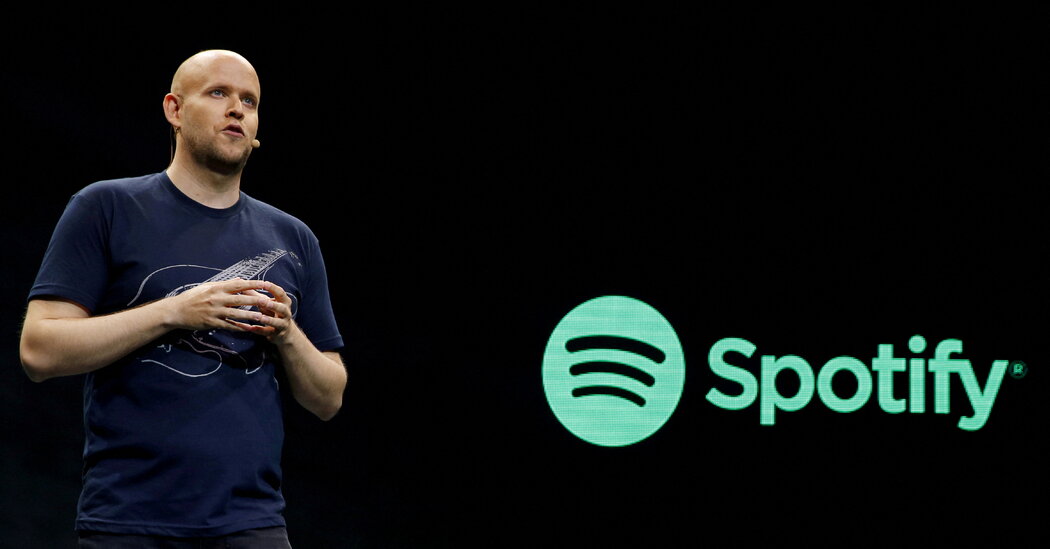
As Spotify released an earnings report Wednesday underscoring the importance of podcasts to its business model, company officials said that they did not expect their subscriber numbers to be affected by the uproar over accusations that its most popular podcaster, Joe Rogan, had spread misinformation about Covid-19 and vaccines.
The company has been embroiled in controversy since Neil Young removed his music from the streaming platform last week, citing Rogan’s podcast and calling Spotify “the home of life- threatening Covid misinformation.” Joni Mitchell and several other artists and podcasters followed suit amid widespread calls on social media to boycott the company. Officials responded by publishing the service’s platform rules and saying that Spotify would begin adding content advisories to podcasts about the coronavirus.
But in an earnings call on Wednesday afternoon, Daniel Ek, Spotify’s chief executive and co-founder, said that the company’s expectations of premium users in the current quarter did not anticipate “churn” caused by the controversy over “The Joe Rogan Experience.”
“In general, what I would say is, it’s too early to know what the impact may be,” Ek said in the call. “And usually when we’ve had controversies in the past, those are measured in months and not days. But I feel good about where we are in relation to that and obviously top line trends looks very healthy still.”
Ek defended the measures the streaming service is taking to combat misinformation, and spoke of “supporting greater expression while balancing it with the safety of our users.”
“I think the important part here is that we don’t change our policies based on one creator nor do we change it based on any media cycle, or calls from anyone else,” he said. “Our policies have been carefully written with the input from numbers of internal and external experts in this space. And I do believe they’re right for our platform. And while Joe has a massive audience — he is actually the number one podcast in more than 90 markets — he also has to abide by those policies.”
Spotify has been facing pressure over Rogan’s podcast since late December, when a coalition of 270 medical professionals published an open letter criticizing an episode featuring an interview with Dr. Robert Malone, who had been previously banned from Twitter for repeatedly posting misinformation about Covid-19. The letter said Rogan had a history of propagating “false and societally harmful assertions” about the virus, including discouraging vaccination among young people and promoting an unproven treatment for the virus, and called on Spotify to “establish a clear and public policy to moderate misinformation.”
The situation reached a boiling point when Young announced he would be removing his catalog, leading several artists to follow, including Mitchell and the guitarist Nils Lofgren. The R&B artist India Arie said Tuesday that she, too, would be pulling her music from the service, citing Rogan’s comments on race. And on Wednesday several of Young’s former bandmates, David Crosby, Graham Nash, and Stephen Stills, asked their record labels to remove their recordings from Spotify.
Pushback also came from several of the company’s other high-profile podcast hosts. On Saturday, Brené Brown, the influential author and host of the Spotify exclusive podcasts “Unlocking Us” and “Dare to Lead,” said she would pause releasing new episodes. On Monday, another popular Spotify podcast, “Science Vs.,” said it would cease publishing new episodes other than those meant to “counteract misinformation being spread on Spotify.” In recent days, the podcast hosts Mary L. Trump, Roxane Gay and Scott Galloway have also said they would either remove their shows from the platform or cease publishing.
The company reported strong performance overall in the fourth quarter of 2021, including year-over-year growth in both paid subscribers — up 16 percent for a total of 180 million — and monthly active users — up 18 percent for a total of 406 million. It also said revenue from advertisements had reached a record 15 percent of total revenue. Podcasts — Spotify says there are now over 3.6 million episodes on its platform — have been an important part of its revenue strategy.
Whether that trajectory will continue is uncertain. The company’s stock dropped in after-hours trading.
“Obviously, it’s been a few notable days here at Spotify,” Ek said during the call. He added that “there’s no doubt that the last several weeks have presented a number of learning opportunities.”




